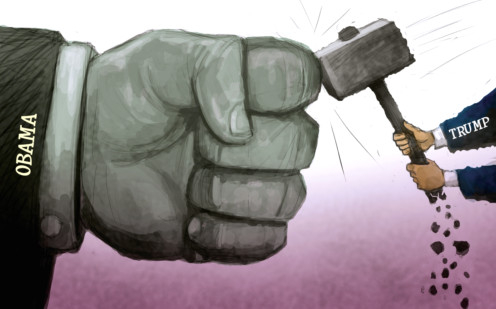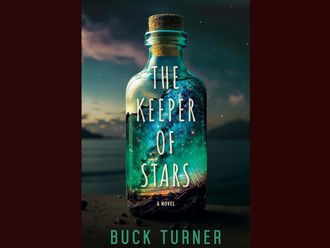
What do you say about a man who first questioned your birth and then your allegiance to your country?
How do you respond to someone who thinks the best way to get your job is to accuse you of being weak and suggest you’re on the side of your nation’s enemies?
For US President Barack Obama and his senior aides, these are not abstract questions. Donald Trump may trigger a widespread sense of disbelief and disgust among Democrats. But inside the White House, they don’t have the luxury of expressing those feelings in public.
So when the moment came for speaking out loud last week , Obama’s response was both highly personal and intensely measured. It was a counterpunching argument against a street-fighting candidate that mixed one-liner rebukes with nuanced policy.
It also pointed the way to how this president — enjoying his final months in office and positive approval numbers — intends to interject in an election dominated by a reality TV star who represents the total repudiation of everything he stands for, in style and in substance.
It was late on his first full working day after the Orlando shootings when Obama let his speechwriters know that he wanted to do something different.
For months, he and his aides had travelled around the nation’s capital to stage security briefings at different agencies and departments to explain their efforts in the fight against Daesh (the self-proclaimed Islamic State of Iraq and the Levant). He didn’t need to travel to get briefed, but he did want the media and the public to pay attention.
Less than three days after the Orlando carnage, Obama was scheduled to make the short walk to Treasury to talk to his own national security council. This time he wanted to do more than update a grieving and fearful nation about his counter-terrorism strategy. He wanted to talk about another battle, a uniquely Washington one, about a single phrase: “Islamic extremism”.
Obama’s obvious reluctance to say those two words had become the single biggest Republican critique of his war against Daesh. Whether his opponents were for or against military action in Syria, they could all agree on the talking points that suggested the commander-in-chief could not wage war against an enemy he could not name.
After the murder of 49 Americans at a nightclub, it was time to respond to the political point-scoring.
Obama took the speechwriters’ draft and extensively reworked the sections that mattered to him most: on Trump’s proposal to ban Muslims entering the United States, and the question of tolerance and diversity in general.
So he was pumped when he entered the formal Treasury room after his national security meeting. He walked through the usual updates on Daesh losing territory, and he berated Congress for failing to confirm a Treasury counter-terrorism official for more than a year.
But the real passion came at the end of his remarks:
There has not been a moment in my seven and a half years as President where we have not been able to pursue a strategy because we didn’t use the label ‘radical Islam’. Not once has an advisor of mine said, man, if we really use that phrase, we’re going to turn this whole thing around. Not once. So if someone seriously thinks that we don’t know who we’re fighting, if there’s anyone out there who thinks we’re confused about who our enemies are, that would come as a surprise to the thousands of terrorists who we’ve taken off the battlefield.
Obama explained how US forces — including “the Special Forces that I ordered to get Bin Laden and are now on the ground in Iraq and in Syria” — understood who they were fighting.
“They know full well who the enemy is. So do the intelligence and law enforcement officers who spend countless hours disrupting plots and protecting all Americans, including politicians who tweet and appear on cable news shows.”
So why not use the words “radical Islam”, like the tweeting politicians have urged him to? Obama explained he wanted to avoid echoing the propaganda of Daesh and Al Qaida that would turn their terrorism into a religious war. “If we fall into the trap of painting all Muslims with a broad brush and imply that we are at war with an entire religion, then we’re doing the terrorists’ work for them.”
This was more than just a response to the Republican nominee’s latest outburst on Twitter. “The leader of the Republican party and many Republicans — it was about much more than Trump — were using this phraseology debate as a fig leaf for their lack of alternative plan, or a strategy that was different from the president. The characterisation of his strategy was not only inaccurate but also absurd,” said Jen Psaki, communications director at the White House.
“Clearly he felt very personally about speaking to this. Gun violence has impacted him very personally in general, almost more than any other issue in his presidency. But also there’s this false debate about language going on at this moment.”
Beyond the terrorism debate, Obama wanted to talk about American values. In his view, the election is no longer about national security policy but about an even more fundamental question — the identity of the United States.
“We’re starting to see where this kind of rhetoric and loose talk and sloppiness about who exactly we’re fighting, where this can lead us,” he told the cameras at Treasury. “We now have proposals from the presumptive Republican nominee for President of the United States to bar all Muslims from emigrating to America. We hear language that singles out immigrants and suggests that entire religious communities are complicit in violence. Where does this stop? The Orlando killer, one of the San Bernardino killers, the Fort Hood killer: they were all US citizens. Are we going to start treating all Muslim Americans differently? Are we going to start subjecting them to special surveillance? Are we going to start discriminating against them because of their faith?”
This is how Obama will fight the 2016 election: not by trolling Donald Trump directly but by arguing that he is undermining American values. In other words, his response to a candidate who questioned his citizenship is to argue about the nature of American citizenship.
“He isn’t going to do the hit of the day against Trump. Hillary will probably do that, and Obama did that when he was a candidate in 2008,” said Jon Favreau, Obama’s former chief speechwriter. “But as president he will make the case that there’s something worthwhile defending about our democracy, as big and messy as it is; that our pluralism is important; that Trump’s vision is antithetical to everything we believe and that the founders of this country believed; and that it’s damaging to our position in the world. He is attacking Trump but in a way that makes him bigger than Trump.”
“He truly believes that the danger that Trump poses is bigger than if Mitt Romney was on the ticket. He’s going to make this case not just because he’s competitive, but because this is the final chapter of the case he has been making since he stood on stage in 2004.”
That was the breakthrough speech at the Democratic convention in Boston when the young state senator said there was no black or white America: there was just the United States of America. As patriotic as that speech was, it’s hard to imagine Donald Trump delivering the same words while also proposing to ban Muslim travel and to torture terrorist suspects. Then again, it’s hard to imagine Trump responding to a personal attack — like the one he fired at Obama after Orlando — in anything other than a personal way. What separates these two men isn’t just a worldview, it’s a question of temperament.
It was Joe Biden who warned back in 2008 that when the world tried to test Barack Obama, “they’re going to find out this guy’s got steel in his spine”. Now, as Trump is testing him, the response from Obama is as cold and clinical as Trump is hot-headed.
“This is a country founded on basic freedoms, including freedom of religion. We don’t have religious tests here,” said the president whose Kenyan grandfather converted to both Christianity and Islam. “Our Founders, our Constitution, our Bill of Rights are clear about that. And if we ever abandon those values, we would not only make it a lot easier to radicalize people here and around the world, but we would have betrayed the very things we are trying to protect — the pluralism and the openness, our rule of law, our civil liberties — the very things that make this country great; the very things that make us exceptional. And then the terrorists would have won. And we cannot let that happen. I will not let that happen.”
The commitment is clear from this hyper-competitive president who still has six months in office. Even though he couches his argument in principled terms, this contest against Trump goes deep. Even though he’s not on the ticket, this one is personal.
— Guardian News & Media Ltd
Richard Wolffe is a Guardian US columnist, as well as chief digital and marketing officer at Global Citizen, a non-profit organisation dedicated to ending extreme poverty.











